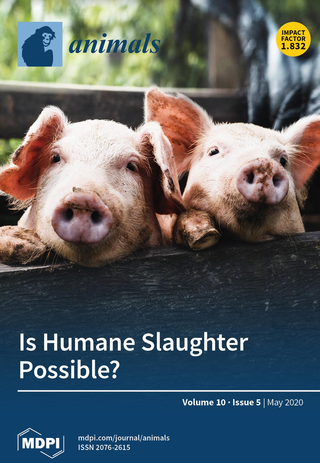Motivation
Is Humane Slaughter Possible?
In a recent paper we argue that it is not!
Posted August 24, 2020 Reviewed by Lybi Ma
One of the biggest ethical issues in animal farming has been the problem of suffering of animals at the end of their lives. Animal welfare scientists have put much effort into finding solutions for the problem of how to minimize the harms to these animals during their transport and slaughter.
In a recent paper that made it onto the cover of the journal Animals, Heather Browning and I tackle the question of whether animal slaughter can ever be truly humane as asserted by the animal agriculture industry.

Let us give you a brief summary from our papers abstract:
Abstract:
In our paper, we have taken a philosophical look at what it means to perform slaughter humanely, beyond simply reducing pain and suffering during the slaughter process. In particular, we will examine the issue of the harms of deprivation inflicted in ending life prematurely, as well as shape of life concerns and the ethical implications of inflicting these harms at the end of life, without the potential for future offsetting through positive experiences. We will argue that though these considerations may mean that no slaughter is in a deep sense truly ‘humane’, this should not undermine the importance of further research and development to ensure that while the practice continues, animal welfare harms are minimized as far as possible. (Browning and Veit 2020)
What do we mean by truly humane? Well, we want to undermine the idea that minimizing harm is naturally humane if the underlying practice is morally problematic in itself.
Think of torture. While there are ways of torturing people that are less problematic than others, less painful, and less injuries, we would nevertheless grant that there is something categorical, something deeply and more intrinsically problematic with the practice.
This we argue is also the case in animal slaughter. Our argument rests on the idea that animals that are slaughtered will be deprived of future welfare losses. This is not based in an empirically unsupported claim about the intrinsic worthwhileness of animal life but rather the idea that animals enjoy their lives and will be harmed if we take future welfare away from them.
This idea, of course, isn't new since we apply it likewise in the human case. Murder is hardly legitimized by doing so in a manner that doesn't directly cause pain. It is here that moral philosophers have preferred to talk about preferences. Humans don't only have feelings, they also have desires, goals, and achievements they want to unlock during their lifetime.
Whether it is marriage, career success, or a personal fitness goal, there is no limit to the goals of humans. In the animal's case, such future-regarding desires have often been doubted. Clearly no animals plans to sacrifice their health and well-being to become the fastest runner of their group.
But animals do emphatically care about whether their future is good or bad. If we end their lives prematurely, we are taking something away from them. A painless death is not the same as a morally unproblematic one.
There is more to say about this matter and I will elaborate on the psychological research in this area, but for not it is sufficient to assert the importance of the minimization of pain and, or, suffering of animals within animal farming practices.
To think that animal farming is inhumane does not directly imply that it is impermissible. You might, for instance, consider the killing of humans inhumane. But that does not imply that it is not permissible under some circumstances.
We thus conclude:
Although we have argued that slaughter will always cause some harm, and thus, never be truly humane in a deep sense, we still support any and all moves to improve welfare and move closer to a more humane slaughter process. (Browning and Veit 2020)


